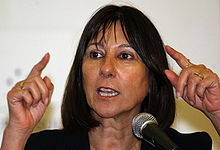Felisa Miceli
| Felisa Miceli | |
|---|---|
 |
|
| Minister of Economy of Argentina | |
|
In office November 28, 2005 – July 16, 2007 |
|
| President | Néstor Kirchner |
| Preceded by | Roberto Lavagna |
| Succeeded by | Miguel Peirano |
| Personal details | |
| Born |
26 September 1952 Carlos Casares, Buenos Aires Argentina |
| Nationality | Argentine |
| Political party | Justicialist Party |
| Spouse(s) | Ricardo Velasco |
| Alma mater | University of Buenos Aires |
Felisa Miceli (born September 26, 1952) is an Argentine economist, and a former Minister of Economy and Production of Argentina. She was appointed by President Néstor Kirchner on November 28, 2005, in place of Roberto Lavagna, and was the first woman ever to lead that ministry. She resigned to the position on July 16, 2007, as prosecutors stepped up an investigation into a bag of cash found in her ministry offices.
Born in Carlos Casares, Buenos Aires Province, Miceli was a student of Lavagna's at the University of Buenos Aires. She was a left-wing activist in the 1960s, and later served as Director-Secretary of the Bank of the Province of Buenos Aires during Aldo Ferrer's tenure as bank president between 1983 and 1987. She then worked in Lavagna's consultant firm, Ecolatina, in the beginning of the 1990s. In May 2002, during the presidency of Eduardo Duhalde and at the height of the Argentine economic crisis, she became part of Lavagna's team as a representative of the Ministry of Economy before the Central Bank. On May 30, 2003, she became the chairperson of the Banco Nación.
She was widely considered a follower of Lavagna, and the successful economic policies instituted by the former Minister were expected to continue in force, but Miceli was viewed as more progressive, as well as less independent from the President (with whom Lavagna had had disagreements). In interviews, she stated that the main goal of her administration would be improving income distribution. Argentina's economy grew by an annual 9% during 2004 and 2005, but average wages in real terms did not recover to the level before the 2002 devaluation of the Argentine peso until 2006, and income poverty, though greatly reduced, remained high by historical standards.
...
Wikipedia
